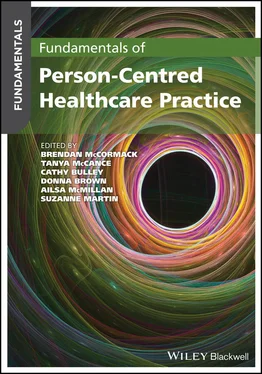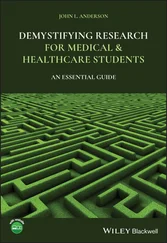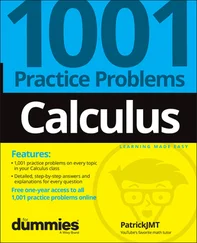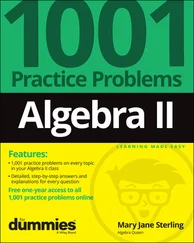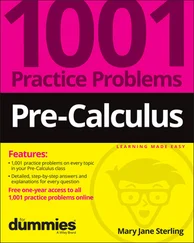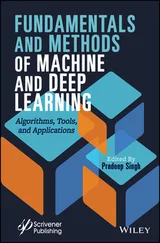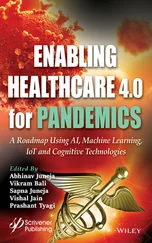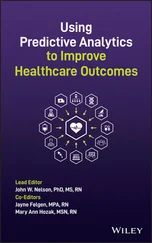As you work through Chapter 1, you will learn who the person is and consider the importance of personhood and why it is essential to person‐centred practice. Chapter 2builds on notions of being a person and encourages you to explore the concepts and complexities of person‐centred practice, paying particular attention to the core values of person‐centredness. In Chapter 3, you will be introduced to the Person‐centred Practice Framework and guided through its component parts and how it links to the key underpinning theoretical concepts described in Chapters 1and 2.
Chapter 4challenges us to explore self. You will be guided to consider different aspects of self and introduced to a variety of different approaches that can be used to know self better. This leads to exploring the concept of human flourishing in Chapter 5. The alignment with person‐centred practice emerges as you engage with this chapter and the activities. We encourage you to take time to participate in the activities and reflect afterwards. Some of the activities can be repeated at various times and we imagine you will become aware of your own development. Chapter 6will enable you to make links between your practice, the required standards you need to demonstrate for professional practice and how professionalism contributes to person‐centred practice. You will also explore the tensions that may exist between the reality of practice and delivering person‐centred care. Finally, Chapter 7examines the future nursing, midwifery and allied health professional in the context of person‐centred practice.
1 The person in person‐centred practice
Brendan McCormack1, Tanya McCance2, and Jan Dewing1
1 Queen Margaret University, Edinburgh, Scotland, UK
2 Ulster University, Northern Ireland, UK
Introduction
Who am I?
What does it mean to be a person?
Personhood
Persons, personhood and person‐centred practice
Conclusion
Summary
References
Further reading
Develop insight into the meaning of ‘person’ in person‐centred practice.
Distinguish the meaning of ‘person’ from other concepts such as individual or people.
Be able to articulate a meaning of personhood and why this meaning is important in person‐centred practice.
Identify and describe the challenges posed for healthcare practitioners when adopting different personhood perspectives
Being a person means more than just existing as a human being. There are elements of our make‐up as persons that we may struggle to understand or make sense of – the deeper parts of ourselves! In this chapter we will explore some perspectives on what it means to be a person as this is the starting point of person‐centredness and person‐centred practice.
There is a sense in which the word ‘person’ is merely the singular version of ‘people’, yet we are all instinctively aware that it has greater meaning than this – that it represents everything about me as a human being. ‘Who am I?’ is a question that is probably asked by many of us at various key stages of our lives – as a part of growing up and forming our identity; at a major transition point in our lives (such as reaching a significant birthday) or at a moment of crisis (e.g. the death of a person [or another entity] loved by us). When we reflect on such a question, we sometimes focus on functional aspects of our lives, such as ‘my’ job, friendships and relationships, ambitions, career prospects, life balance, etc. However, we can also focus on some core aspects of our being, such as the core values, beliefs or attitudes I hold towards particular aspects of my life, i.e. who I REALLY am! To start, we would like to invite you to engage with the following activity.
Activity Who am I as a person?
For 20 minutes, create a collage (this could be either on paper or in digital form) representing your own self‐portrait based on the following 10 points for creating your portrait. Place your name in the centre of the collage.
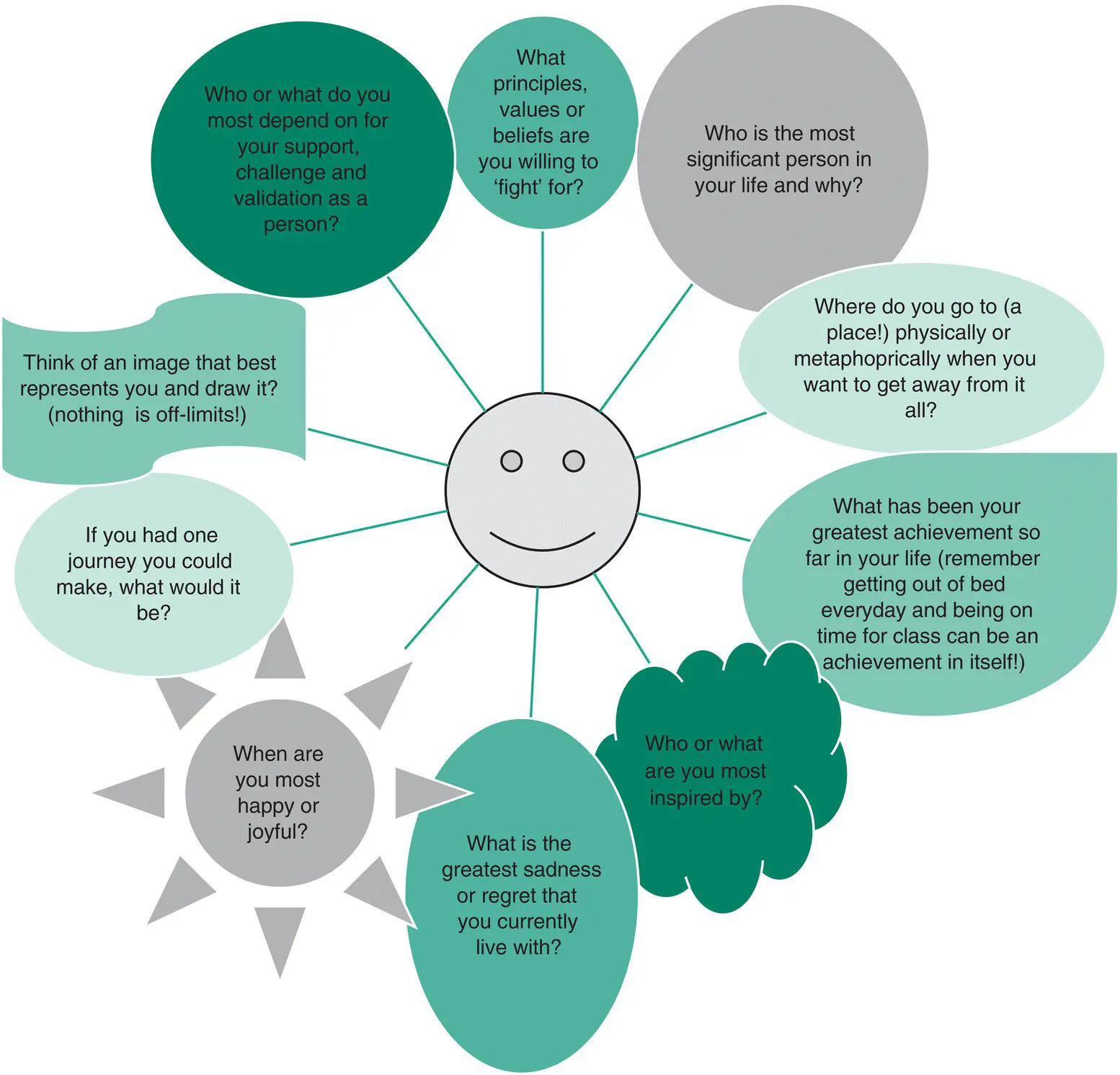
Reflect on your answers to these questions. Is there anything that surprises you about your answers? Have you gained new insights about yourself as a person? What do your collective responses tell you about who you are as a person?
Each time we (the chapter authors) do this activity, we are surprised at some of the things that emerge. No two collages are ever the same – there may be some common elements (such as a place of importance) but we are always interested in the things that evolve or transform (a key learning and its influence on us as persons). When we share these with others, the differences reflect changes in us as persons, our different experiences and learning from those, as well as shifts in thinking about our ‘being in the world’ and what is important over time. All this highlights how we exist in a dynamic state and are constantly evolving as persons.
What does it mean to be a person?
The word ‘person’ has been debated for as long as philosophical thought has existed and there are many perspectives on what it means to be a person. How we distinguish between persons and other species (such as non‐human animals and robots) is a key focus for discussion and debate and the differing philosophical stances adopted have influenced the development of theories and frameworks for centuries.
There are multiple ways in which to consider the meaning of ‘person’ and indeed an animal rights advocate might argue vehemently that it is morally wrong to privilege the rights of human persons over those of animals (Singer 2011). They would strongly believe that it is morally wrong, for example, to test pharmaceuticals or cosmetics on animals before they are used with humans. Their argument would be predicated on the belief that humans and animals are equal and thus should be treated equally. For others, humans are considered to be a higher order species to animals and thus it is reasonable to use animals in this way in order to benefit the greater good of humans. You might like to reflect on your stance in this argument and where your boundaries are regarding speciesism (meaning biases or prejudices against beings on the basis of their species). You might also like to view this short video on speciesism by Professor Peter Singer: www.animalsandsociety.org/human‐animal‐studies/defining‐human‐animal‐studies‐an‐asi‐video‐project/defining‐speciesism‐with‐peter‐singer. This kind of argument gets played out in many ways in our daily lives and the fact that such emphasis is placed on preserving different species is not just an ecological argument but also a moral one where the rights of animals have been elevated in importance in recent years.
Even within the ‘human species’, a ‘person’ may mean different things, so, for example, debates about abortion are influenced by different ideas about whether or not an embryo is a person; is a foetus a person or when does a foetus become a person? This is a complex issue with different moral philosophical perspectives used to defend different beliefs and practices. We suggest the core issue is that of when a human being becomes a person – is it at the point of fertilisation or is it when the foetus is able to sustain life independent of the womb?
Physical and psychological attributes
Читать дальше
